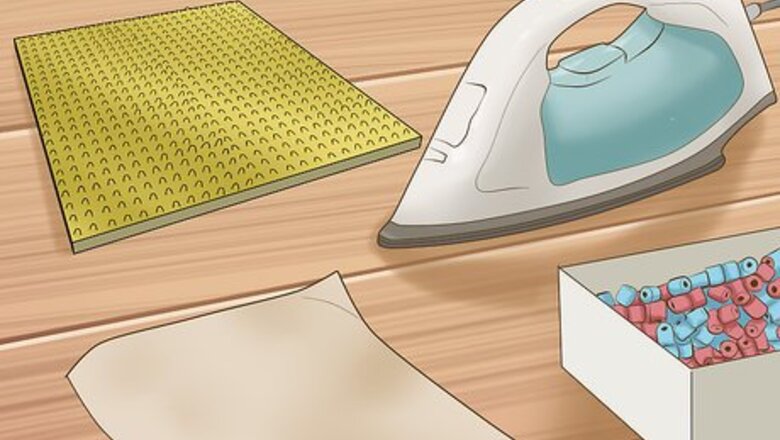
views
Assembling Your Design
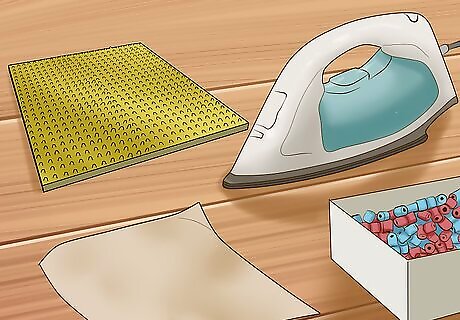
Assemble your Perler beading supplies. You'll need a flat, stable area to make your Perler bead design. The pegboard you'll be using for your beads has very small pegs, so an unlevel surface may cause the beads to fall off. In all, for your Perler beading project, you'll need: A Perler pegboard An iron Parchment paper (or Baking paper) Perler Beads
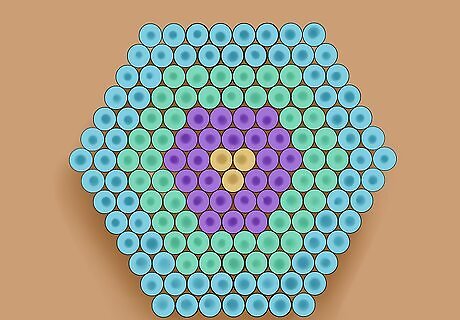
Choose your pegboard or use a pattern. There are many shapes you can choose from. You could create a dog, a fish, a hexagon, a shoe and so on. Perler makes many different shapes of pegboards, but you could also use a pattern and a clear Perler pegboard. If you have a larger design in mind, you could use large, interlocking Perler pegboards. These can be clipped together, giving you room to create. The shape of Perler beads will give the image you are trying to make a pixelated look. This makes Perler beads perfect for imitating old school video games. Many of these patterns can be found for free online. There are many online sites that offer free Perler patterns, but you can purchase official patterns from the Perler online store as well. Patterns can be downloaded to your personal computer, printed, slid under a clear mat, and used to guide your Perler art.
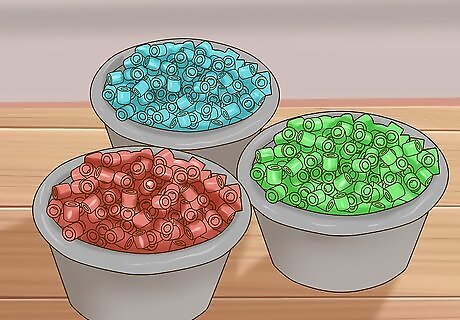
Select the colors. Perler beads, being rather tiny, can be elusive in the container. So you don't have to struggle digging out a color from your supply while beading, you may want to separate the colors you plan on using into several small bowls or ramekins. Some designs call for a specific number of beads to be used. When following a design like this, you may want to gather a few extra beads in each color, just in case you lose one while beading.
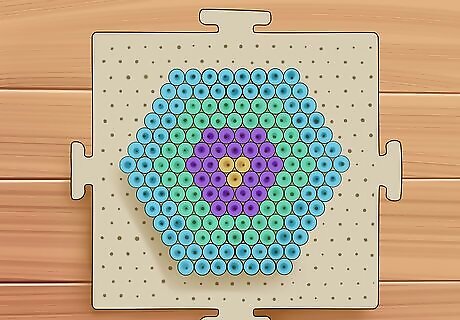
Bead according to the pattern. If you are following a shaped pegboard, like a pegboard shaped like a cat for example, you should slip the beads onto the raised pegs in the arrangement you desire. If you are using a clear, square shaped pegboard, you should slide a pattern underneath before beading, or you could create a freeform design of your own making. When using a pattern beneath your pegboard, it's important to make sure the pattern is properly aligned with the pegs. Each bead represented by the pattern should center around a peg. You might make use of a realistic color scheme, or you might choose wacky colors to give your creation character. Your imagination's the limit! Due to the fact that the pegs of your Perler pegboard are so small, it's very easy for you to jostle the board and knock your beads loose. To prevent this, you may want to lay a non-slip craft mat beneath your beading project. You can put your Perler beads onto the pegs in any way that works best for you, but you may want to consider working from the bottom up or top down. Working from the outside in can crowd the empty pegs on the inside of the board, which may cause you to accidentally knock beads off of pegs.
Fusing the Beads Together
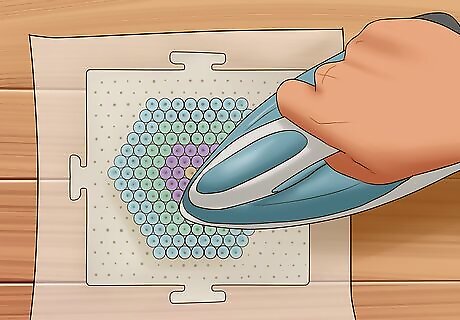
Heat your beads. Take your parchment paper, which is also sometimes called ironing paper, and place it over the beads on the pegboard. You should be careful when doing this so that you don't accidentally knock any beads out of place. Heat a dry iron to a medium setting, then slowly run it in a circular motion over the parchment paper. You'll have to continue this for about 10 seconds for the beads to stick together. The amount of time this takes can vary depending on factors like the kind of iron you are using. You may want to remove your iron at intervals and check your design every five seconds. Applying too much heat could turn your design into a Perler pancake! If you have an iron with a steam function, you should be sure this is turned off when heating your beads. Steam could affect the outcome of your design. It will also definitely ruin the piece of parchment paper/baking paper making it un-reuseable. Wax paper can be used when heating your Perler beads, but this can leave a waxy residue on the finished product. Parchment paper, on the other hand, will not. You can also place Perler beads in the oven at a very low temperature to melt them.
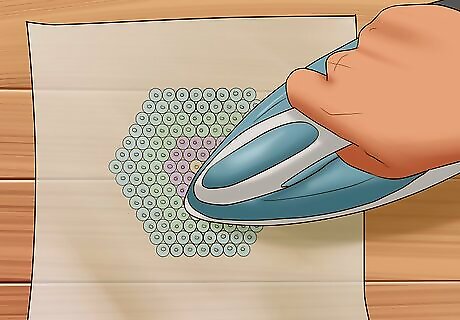
Heat the opposite side of your beads. *Please note that this is optional. If you like the way it looks with one unfused side, then you should keep it that way. After allowing a little while for the beads and board to cool, you should flip your peg board over. This will make the beads fall off the board and expose the un-heated side of your beads. Place the parchment paper over your beads, and heat the beads in the same fashion you did before. Use medium heat, a dry iron, and circular motions for about 10 seconds.
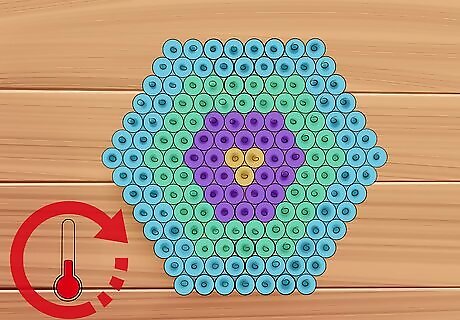
Peel away your parchment paper and allow time to cool. Take the parchment paper by one corner and peel it away from the pegboard. Your beads will be quite warm right after you finish ironing, so you should allow a few minutes to cool before handling your Perler art. Your Perler bead design is now ready to show off! Remove it from the pegboard and show your friends the design you have created.
Adding to Your Perler Creations
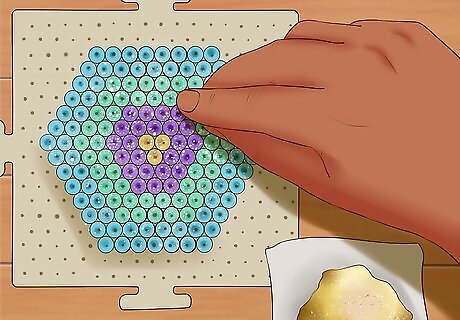
Make your Perler designs sparkle. This can give your art a magical appearance and is a useful touch when making ponies, unicorns, or fairies. Simply take some fine glitter and sprinkle it on your beaded pegboard before applying your heat. After you're done heating, your finished product will sparkle! You could also purchase Perler beads that already have glitter mixed in with the bead. These can be used as normal, and create a great effect.
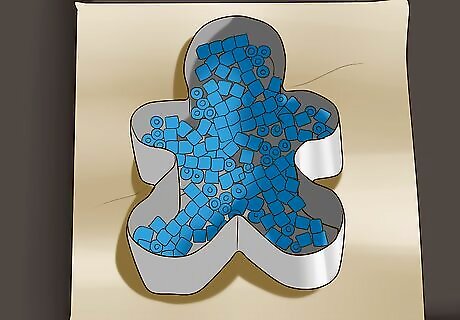
Create Perler bead ornaments. Layer parchment paper on a cookie sheet and place metal, oven-safe cookie cutters on the paper. Then, add Perler beads to your cookie cutters. You could choose to fill your cookie cutters with a single color or you could even mix several colors together. Be sure you don't fill your cookie cutters to the top; this could result in your beads spilling over the rim of the cookie cutter. To melt your beads, you should preheat your oven to 400°. When it's finished preheating, bake the Perler beads for 10 minutes. After that, remove your beads, allow time for the beads, pan, and cookie cutters to cool. Once cool, you can pop your Perler beads free of your cookie cutters. The beads will be melted in the shape of your cookie cutter. There should be space for you to thread a small string through the gaps in your fused Perler beads. Do so and tie the ends of the string together to complete your ornament. You should check your beads while baking. Some ovens may run a little hotter or colder than others, meaning you might have to add or subtract from your bead bake time.
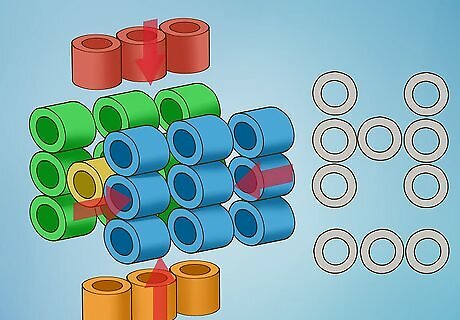
Create a Perler cube. This design will be easiest on a medium sized, square shaped beading mat. On your mat, lay out two separate rows of Perler beads three across. Then lay out three separate H shapes on your mat, with the sides each being three beads long. The connector piece in the middle of the H will be a single bead. Each of these should be separated by at least one empty row of pegs. Place parchment paper atop your beads and lightly apply heat. For this design to work best, you'll need your beads to be as lightly fused together as possible. Flip the mat and apply light head in the same fashion to the opposite side. Allow the beads to cool, then build your cube by stacking your H shaped pieces atop each other. Snap your three bead long pieces into the empty spots in the middle of the stacked H. The size of the beads should create a close fit between the pieces. This will hold the design together by friction. Your cube is done! If your beads aren't fitting together tightly enough to maintain the shape of your cube, you may need to use some glue. A dab of hot glue on the pieces oriented toward the inside of the cube should do the trick.
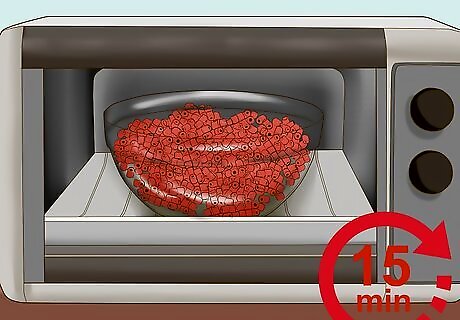
Create a Perler bowl. Take an oven safe glass bowl and pour Perler beads into it. Arrange your beads so a thin layer is formed that climbs up the sides of the bowl. Preheat your oven to 350°, and when it is ready, insert your bowl into the oven. After 15 minutes, remove the bowl from the oven. Your beads should now be melted into the shape of the bowl. Allow time to cool, then remove your Perler bowl. Keep an eye on your Perler beads while baking. Baking too long could melt your Perler bowl into a puddle.













Comments
0 comment